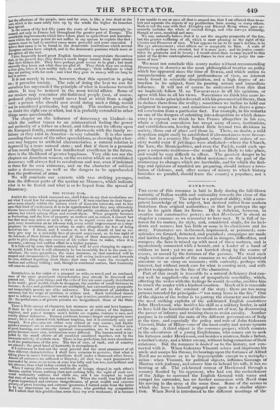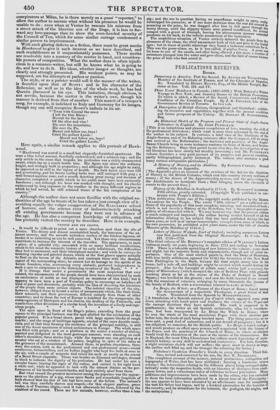II AWK WOOD.
Tim scene of this romance is laid in Italy during the full-blown maturity of Italian wealth and nationality towards the close of the fourteenth century. The author is a person of ability, with a competent knowledge of isis subject, but derived rather from modern historians than original authorities; so that he portrays the age less in its spirit than its forms, lie is deficient, however, m creative and constructive power; so that Haw/mood is about as singular a romance as we remember to have met. It is full of interest for its matter, its style, and, considered singly, for its incidents and scenes ; but has little or none in its characters and its story. Potentates are dethroned, imprisoned, or poisoned; conspiracies are formed, detected, and punished; campaigns are made and battles fought ; lovers are involved in dangers, difficulties, and escapes ; the hero is mixed up with most of these matters, and is mysteriously connected with a hermit, and a leader of a band of robbers to boot : yet we are not hurried along by the course of events, or moved by the fortunes of the persons. We read each single section or episode of the romance as we should an historical anecdote or an essay on manners ; with curiosity, perhaps with interest, but without much care far what is coming next, and with perfect resignation to the fate of the characters.
Part of this result is traceable to a natural deficiency that cannot well be supplied—the want of sympathetic sensibility, which, affecting the writer with the feelings he would describe, enables him to touch the reader with a kindred emotion. Much of it is traceable to want of art in the conduct of the story : there are too many persons intended for principals—" too many irons in the fire." One of the objects of the writer is to portray the character and describe the most striking exploits of the celebrated English condottiere John llawkwood, who besides his skill as a military leader, is said to have laid the foundation of the modern art of' war, by discovering the power of infantry and training them to resist cavalry. Another purpose is to exhibit the state of the different governments of Italy at the time, and especially the policy and rule of John Galeazzo Visconti, Duke of Milan—one of the most crafty and astute tyrants. of the age. A third object is the romance proper; which consists in the adventures of a young Englishman, who comes out to seek his fortunes under llawkwood, and besides a mistress, finds a father, a mother's story, and a bitter enemy, without being conscious of their existence. But the romance is hooked on to the history, not connected with it. When Galeazzo Visconti seizes and imprisons his uncle and usurps Isis throne, its bearings upon the fortunes of Alfred Nevil are so remote as to be imperceptible except to a metaphysician : when Visconti, for political objects, inflames Gonzaga of' Mantua with jealousy, and causes him to behead Isis wife, it has no bearing at all. The celebrated retreat of II-awl:wood through a country flooded by his opponent, who had cut the embankment of' the Adige to surround the English General with water and compel his surrender, has no further connexion with Nevil than his serving in the army at the same time. Some of the scenes in which the hero is himself engaged are open to a similar objection. When Nevil is introduced to the different meetings of the vonspirators at Milan, he is there merely as a quasi "reporter," to allow the author to narrate what without his presence he would be unable to do : even when at Venice he rescues his mistress from a street attack of the libertine son of the Doge, it is less to forward any love-passage than to show the even-handed severity of the Council of Ten, which for some similar outrage condemned a similar person to imprisonment.
With such glaring defects as a fiction, there must be great merits in Hawkweed to give it such interest as we have described, and such readableness as it unquestionably possesses. These merits are resolvable into a mastery of the matter in hand, and considerable powers of composition. What the author does is often injudicious in a romance-writer, but still he knows what he is going to do, and how to do it. His ideas, whether images or thoughts, are clearly and strongly presented. His weakest points, as may be supposed, are his attempts at pathos or passion.
The style, or as a painter would call it the manner of the writer, is founded upon that of SCOTT; and in his character of the Bohemian, as well as in the idea of the whole work, he has had Quentin .Durward in his eye. This imitation, though obvious, is not servile, because the matter is the writer's own, though his manner is derived from that of another. This snatch of a trooper's song, for example, is indebted to Italy and Germany for its images, though any one will recognize SCOTT'S ballads in its air.
"'Twos with Conrad the rover
I left the blue Rhine : Hurrah for the land Of the olive and vine Ilie over the mountains, Hie over the Po,
Mount and follow me, boys! Cried the gallant Lando :
Mount and follow me' boys!
Cried the gallant Lando.'
Here again, a similar remark applies to this portrait of Hawkwood.
" Haivliwood was seated in a small but elegantly-furnished apartment. He wore a blue velvet surcoat, fancifully embroidered, and it crimson cap ; and the only article in the room that bespoke his profession was a richly-ornamented sword, which lay on a couch beside him. His figure was above the ordinary height, and strongly built in proportion ; and although his age might be sixty, he appeared so be still in the vigour of health. His dark hazel eyes were full and penetrating, and his brown curling locks were still untinged with gray ; a well•formed aquiline nose, and a mouth denoting great energy and decision of character, completed a profile which in his youth must have been eminently handsome; and although his brow was marked with thought, and his cheeks embrowned by long exposure to the weather in the many different regions in which he had served, he still retained traces of the fair complexion of his country."
Although the author does not seem familiar with the original authorities of the age he treats of, he has taken a just enough view of it : avoiding equally the vulgar exaggeration of the RADCLIFFE school of horrors, and the solemn error of indiscriminately attacking all existing governments because they were not in advance of the age. He has also a competent knowledge of antiquities, and has probably visited the scenery be describes. Here is an example.
VENICE AND ITS SHOWS.
• It would be difficult to point out a more cheerless spot than the site of Venice. The dreary and almost uninhabited beach, the tameness of the adjacent scenery, and the smooth unbroken surface of the tideless lagoons, all render it as uninviting as can be well conceived. Yet those very circumstances contribute to increase the interest of the traveller. The appearance, in such a place, of a splendid city, associated with so many brilliant recollections, recals to his mind the romantic history of its early inhabitants, the difficulties they had to surmount, and their triumphant success ; and while he surveys its towering cupolas and painted domes, which at the first glance appear actually to float on the bosom of the Adriatic, and contrasts them with the desolate aspect of the surrounding shore, he cannot but do homage to the spirits of its heroic founders, who, overcoming every obstacle, preferred independence in such a spot to submission to the destroying invaders of the North. * * * It is strange that under a government the most suspicious that ever existed, the amusements of the people should have been characterized by such an exuberance of mirth as was displayed on occasions of this kind; but it appears to have been a part of Venetian policy to encourage on holydays all kind of game and diversions, probably with the idea of diverting the attention of the people from more serious objects. The isolated situation of the city, however, obliged them to invent a series of amusements which, like their dress, their manners, and their government, differed entirely from those of other countries; and to them the rest of Europe is indebted for the masquerade, the extravagancies of Harlequin and his clowns, the drollery of the Pulcinella, and numberless other diversions of a similar kind, the invention of a lively and ingenious people. The open space in front of the Doge's palace, extending from the great square to the principal harbour, was the spot allotted for the celebration of the popular games. It is a broad street, paved with large square blocks of rough marble ; and the range of buildings opposite, erected of the same durable materials, and at that time forming the residence of the principal nobility, is still one of the fittest specimens of mixed architecture in Europe. The whole space was filled with people; and on a platform in the centre a number of clowns, painted and disfigured in the most grotesque manner, were standing on each other's shoulders, three stories high, while the topmost one was grinning at a senator who sat at a window of the palace, laughing in spite of his robes at the grimaces of the mountebank. Around them, in profuse abundance, there were fire-eaters, both in the professional and non-professional sense—sword swallowers, fortunetellers, and an Indian juggler who kept five balls at once in the air, with a couple of serpents tied round his neck as neatly as the cravat of a Bond Street exquisite. There was besides an itinerant astrologer, dressed in black to indicate the dignity of his profession. He had under his arm a circular frame, bearing the signs of the zodiac' and, carried in his right hand a white rod ; while he appeared to look with the utmost disdain on the performances of his brother-mountebanks, and kept entirely aloof from then,.
But what caused the greatest merriment among the populace was the appearance on the platform ot a pig, whose spare flanks and remarkable longitude of
limb showed that his diet of late had been none of the fullest. The animal's tail was then carefully shaven and soaped,—for this elegant pastime, grave reader, is of Venetian origin,—and it was afterwards let loose, followed by the nimblest of the crowd. There are few animals, however, swifter than a lean pig; and the one in question. having no superfluous weight to carry, easily outstripped his pursuers; or if one more dextrous than the rest did succeed in pouncing on the prize, he was dragged after him in .full speed through the merry throng, until the slippery tenure seism proved insufficient, the animal escaped with a grunt of triumph, leaving his adventurous pursuer extended prostrate on his back, to the infinite amusement of the bystanders. The amphibious situation of Venice entirely debarred the people from the pleasures of the chase, the chief amusement both of rich and poor in the feudal ages ; but in times of public rejoicings they found a ludicrous substitute for it. This was the goose-chase, or, as it was called, il pigliccr Neut. A goose mis let loose in one of the canals, and after being allowed a fair start, a number of swimmers plunged into the water and gave chase, and the bird of course became the prize of him who first seized it.



























 Previous page
Previous page